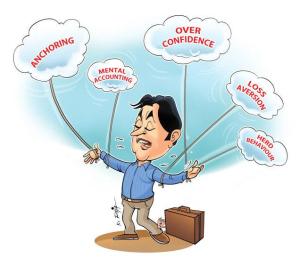 In the recent American Economic Review (May 2015) there is a interesting paper on Behavioural Economics in the Classroom by David Liaison (Harvard University) and John List (University of Chicago). They talk about ways of incorporating behavioural economics into first-year undergraduate economics courses. Rather than teaching it as stand alone they prefer an integrated approach as it enable behavioural insights to show up where they are conceptually most relevant.
In the recent American Economic Review (May 2015) there is a interesting paper on Behavioural Economics in the Classroom by David Liaison (Harvard University) and John List (University of Chicago). They talk about ways of incorporating behavioural economics into first-year undergraduate economics courses. Rather than teaching it as stand alone they prefer an integrated approach as it enable behavioural insights to show up where they are conceptually most relevant.
We want students to see that behavioral economics is an integrated part of economics, not a freak show that is isolated from “the standard ingredients” in the rest of the economics course.
They emphasize 6 key principles of behavioural economics:
1. People try to choose the best feasible option, but they sometimes don’t succeed.
In other words, people try to make the optimal choice—they are optimizers—but they sometimes make mistakes. It’s important to emphasize that these mistakes are partially predictable. One of the key explanatory factors is experience and training: experienced decision-makers tend to make better choices than inexperienced decision-makers.
2. People care (in part) about how their circumstances compare to reference points.
This refers to loss aversion when people lose or gain relative to their reference point. Research has shown that people are more sensitive to losses compared to gains of similar magnitude. The endowment effect also applies here. It refers to is the hypothesis that people ascribe more value to things merely because they own them. This is illustrated by the observation that people will tend to pay more to retain something they own than to obtain something owned by someone else—even when there is no cause for attachment, or even if the item was only obtained minutes ago.
3. People have self-control problems.
In a traditional economic model there is no gap between a person’s good intentions and their actions. By contrast, in the model of present bias, people plan to work hard (or diet, or exercise, or quit smoking, or save for retirement, or stop borrowing on their credit card, etc.) and then renege at the last second.
4. Although we mostly care about our own material payoffs, we also care about the actions, intentions, and payoffs of others, even people outside our family.
These “social preferences” come in many systematic forms, especially negative reciprocity, behindness aversion, and social pressure. The ultimatum game could be played here. The first player (the proposer) receives a sum of money and proposes how to divide the sum between himself and another player. The second player (the responder) chooses to either accept or reject this proposal. If he rejects neither party get anything.
5. Sometimes market exchange makes psychological factors cease to matter, but many psychological factors matter even in markets.
If investors with behavioural biases are a small part of the total stock market, their beliefs will not drive stock prices because perfectly rational traders will sell the stocks that the biased investors are buying, keeping stock prices near their “rational level.” However, if biased investors compose a large portion of the total asset market (and marginal traders), their beliefs will matter.
6. In theory, limiting people’s choices could partially protect them from their behavioral biases, but in practice, heavy-handed paternalism has a mixed track record and is often unpopular.
Behavioural insights imply that if the government is well intentioned and sophisticated, paternalistic policies might be helpful. However, heavy-handed paternalism raises new problems.
They make some good comments about nudges which recommend certain decisions from consumers without impacting on their freedom – libertarian paternalism. They recommend asking students the question should the obesity problem that is prevalent worldwide be solved by nudges or sugar taxes, or is obesity a choice that has little or no role for government intervention?
In conclusion they say:
If you want to boil behavioral economics down for a classroom summary you might say that most people are located somewhere between Mr. Spock and Mr. Simpson (aka Homer). Like Mr. Spock, Mr. Simpson is also an optimizer— he tries to choose the best feasible option. He’s just not good at it. We need to study and model all optimizers: the good, the bad, and those in between.







